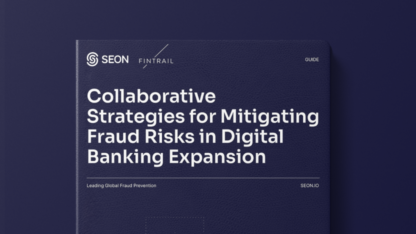- SEON: Prevent All Kinds of Fraud
- SAS: The Analytics Specialists
- Actico: Investigate AML and Compliance
- TruValidate: The Former iGaming Go-To
- Feedzai: AI-Powered Risk Management
- i-Sight: Case Management Powerhouse
- Hunchly: Evidence Collection for Pros
- Nethone: In-Depth Device Profiling
- Pipl: The Modern White Pages
- ArkOwl: Lightweight Data Enrichment
Top 10 Fraud Investigation Software
Fraud investigation software tends to be designed with specific fraud types in mind. We’ve tried to cover the best in various categories.
SEON
Prevent All Kinds of Fraud
Fraudsters are adaptive. They don’t care what kind of business model you operate as long as they can exploit it. SEON platform was designed to address that problem. The key idea? To offer multipurpose, modular tools that can adapt to your fraud risk.
The biggest bonus of using SEON is that it’s suitable for every industry, from neobanks to iGaming companies and from online stores to buy now pay later (BNPL) businesses. The platform is highly customizable, granular and also offers machine learning.
Pros
- Flexible and powerful
- Digital footprinting
- Supports compliance investigations
Cons
- No on-site integration
SEON Pricing
- Starts at $599. Also, free plan available with limited API calls.
Choose SEON If
- You put people first and don’t want to weigh down the experience of customers or staff.
SEON Pros
- Flexible and powerful: You could reduce fraud rates by up to 99%, whether ID fraud, account takeovers, or chargebacks.
- Unique reverse digital footprint lookup: SEON is one of very few fraud investigation software on this list that lets you learn about users’ social media and online profiles.
- Flexible and transparent pricing: You get a completely free plan that only limits the number of API calls you can make. Paid plans are flexible and you can cancel anytime.
- Supports compliance investigations: If you need to go over specific checklists for anti-money laundering (AML) and Know Your Customer (KYC) purposes, SEON has the right features.
SEON Cons
- No on-site integration: If you want your fraud investigation software to live on-premise, you’ll need to look elsewhere.

SAS
The Analytics Specialists
As a full analytics investigation platform, SAS is in a good position to help with fraud prevention. It’s exactly what the company’s Detection and Investigation product offers, using embedded artificial intelligence and machine learning.
A key advantage of SAS is its social network diagram feature, which will help you visualize where fraud lies in your business so you can investigate it better.
Pros
- Multi-purpose
- Powerful data science tools
- Social network analysis
Cons
- Dated user interface (UI)
- Pricey
SAS Pricing
- You won’t find a clear answer on the website, but online users report packages starting at $6K per year, going up to $64K per year, depending on the features you need.
Choose SAS If
- You want the convenience of visualizations and appreciate a hybrid approach.
SAS Pros
- Multi-purpose: You can use SAS for fraud prevention, generic data analytics, and statistical models.
- Powerful data science tools: More technically-minded fraud managers can play with clustering regression, natural language processing, and more.
- Social network analysis: Not to be confused with reverse social media lookup, this feature lets you visualize connections between data points.
SAS Cons
- Dated UI: SAS is a powerful tool but not the best-looking software, unfortunately.
- Pricey: As far as investigation tools go, SAS appears to be at the pricier end of the spectrum.
Actico
Investigate AML and Compliance
If the kinds of fraud investigations you undertake relate to compliance, Actico is a strong contender. The “digital decisioning platform” favored by companies such as Santander, Volkswagen Financial Services, and ING is a one-stop shop for AML, KYC, and Know Your Transactions (KYT).
In short, it’s a complete compliance suite, which includes tools for Politically Exposed Person (PEP) and sanction lists investigations.
Pros
- Compliance investigation tools
- Traditional financial institution (FI) experience
Cons
- Dated UI
- Not ideal for some industries
Actico Pricing
- It’s only available upon request.
Choose Actico If
- You have AML and KYC compliance needs to cover, in addition to fraud concerns.
Actico Pros
- Compliance investigation tools: Learn more about your users and transactions to avoid KYC and AML fines.
- Traditional FI experience: Renowned financial institutions trust Actico, so you’re in good hands with its fraud investigation tools.
Actico Cons
- Dated UI: It’s a legacy product, and it shows. The user experience could be more modern.
- Not ideal for all verticals: You’ll get excellent tools for financial products and institutions. Online stores and iGaming companies, among others, should probably look elsewhere.
TruValidate
The Former iGaming Go-To
The iGaming world is unique, requiring specific tools to investigate its fraudulent schemes, including poker chip dumping, collusive play, bots, and multi-accounting users.
This is how TruValidate, formerly known as Iovation and TransUnion, made its mark – by providing anti-fraud tools for iGaming companies such as online casinos and poker rooms.
Pros
- Large anti-fraud tool ecosystem
- Full KYC and authentication tools
Cons
- Reliance on databases
- Lengthy onboarding
TruValidate Pricing
- Only available via a sales call.
Choose TruValidate If
- You’re looking to combine fraud prevention and investigations with biometrics and IDV.
TruValidate Pros
- Large anti-fraud tool ecosystem: Since its acquisition by TransUnion, Truvalidate (formerly Iovation) has deployed a handful of powerful anti-fraud tools for specific use cases.
- Full KYC and authentication tools: These include identity document verification (IDV) and biometrics authentication.
TruValidate Cons
- Reliance on proprietary databases: Using shared IP blacklists has its advantages, but it’s possible to manipulate them, and you may miss the latest fraud attacks.
- Lengthy onboarding: It starts with a handful of sales calls and then eventually a demo. But you’ll have to sign up for a lengthy contract before you can test TruValidate with your own business data.
Feedzai
AI-Powered Risk Management
This vendor focuses firmly on financial fraud for banking, fintech, and payments processing. It boasts offices in 11 different cities around the world.
Feedzai is all about data science and whitebox machine learning. However, this does not mean ignoring humans altogether: On the contrary, the Feedzai promise is to provide real-time alerts and scoring, so that fraud analysts are better equipped to conduct their investigations.
Pros
- Tier 1 bank experience
- Visual link analysis
Cons
- Tailored to enterprise
- No alternative data
Feedzai Pricing
- Due to its size and target clientele, Feedzai’s pricing model has been described as rather complicated. It is not available without speaking to someone from the team.
Choose Feedzai If
- You want a data-based fraud platform with extensive logging and reporting.
Feedzai Pros
- Tier 1 bank experience: Feedzai is a solution of choice for illustrious banking institutions, including Lloyds and Santander.
- Visual link analysis: Offers “hyper-granular” customer profiles to empower human analysts to make better decisions and investigations.
Feedzai Cons
- Tailored to enterprises: As it mainly caters to enterprises, it is not likely to be suitable for smaller companies, including fintechs – while cost remains a concern.
- No alternative data: In a world where your online identity is a clearer indication of who you are than your passport, Feedzai does not provide data enrichment or email analysis tools out of the box.
i-Sight
Case Management Powerhouse
Canadian company i-Sight markets a dedicated case management platform well equipped to offer up a wealth of data to assist fraud investigations. And in fact, it has been around since 1999, making it the oldest solution on our list.
This vendor’s customers include household brands such as Hello Fresh, Electronic Arts, Johnson & Johnson, and Costco. It can help with HR issues, fraud, and forensic investigations. Beyond this, it also addresses insurance fraud, corporate security, and compliance.
Pros
- Highly specialized
- Quick and easy reporting
Cons
- Internal investigations only
- No data enrichment
i-Sight Pricing
- Unfortunately, there is no pricing information available online – however, the company promises that the software “pays for itself in seven months,” according to the official website.
Choose i-Sight If
- You often have several teams collaborating in each (internal) fraud investigation.
i-Sight enables companies to have one point of reference for each case, for better, more thorough investigations and allowing various stakeholders to collaborate seamlessly. From there, reports can be easily generated.
When used to catch and mitigate fraud, i-Sight is most useful in figuring out what went wrong in order to get a clearer view of gaps in policy, then implement new processes and fraud rules to prevent it from reoccurring in the future.
i-Sight Pros
- Highly specialized: As it caters to very specific use cases, i-Sight does these very well. However, it does not tailor its investigations to fraud in particular.
- Quick and easy reporting: You can easily export detailed documentation with templates for each case file.
i-Sight Cons
- Internal investigations only: Though this brand is exceptional at managing cases and assisting investigations, it does so for corporate fraud instigated by your employees – or enabled by them.
- No data enrichment: This company has addressed the potential to gather extra data from open source intelligence (OSINT) sources in the past, yet this is underutilized in the current version of the software.
Hunchly
Evidence Collection for Pros
An increasing number of companies and individuals around the world have a vested interest in the results of online investigations using OSINT.
Hunchly is a browser extension built to assist with this. It was created by Canadian security consultant Justin Seitz, who is known for his anti-terrorism research and other open investigations – especially on the dark web.
Pros
- Built by insiders
- Set-and-forget
Cons
- Investigator wingman
- Doesn’t scale
Hunchly Pricing
- For a single user on as many devices as they like, Hunchly costs $129.99 annually. Conveniently, there is a 30-day free trial.
Choose Hunchly If
- You want a no-frills, convenient way to keep good track of your fraud investigation journeys across the web.
As its creator noted in an April 2016 article on Medium, the evidence collection tool was developed as the web is ever-changing and information is transient. When conducting manual investigations online, nobody should assume the resources, references, and evidence they locate will remain in place for good.
Besides, a lot of very important information present online is not indexed by Google – be it because it’s on the dark web or simply because it’s private to some extent, such as a Facebook group.
Hunchly captures the entire session and lets the investigator keep what they need, be they from law enforcement, cybersecurity, fraud prevention, the media, or investigating privately. This is extremely convenient for anyone whose research needs to be backed up by facts. However, it is not suitable for those who are looking for assistance with the research process itself.
Hunchly Pros
- Built by insiders: One of the tools developed by an expert to optimize their own efforts, Hunchly is not about bells and whistles but about getting the job done reliably.
- Set-and-forget: Because Hunchly runs in the background, you can focus on the essence of your research instead of constantly pausing to capture evidence.
Hunchly Cons
- Investigator wingman: To borrow the words of its creator, this tool looks to assist investigations rather than enable or automate them.
- Doesn’t scale: The research is still conducted manually and relies on the user’s expertise. Though it is excellent at capturing evidence, it will not signpost investigators to new sources nor enrich data.
Nethone
In-Depth Device Profiling
That “know your user” (KYU) is a buzzword for Nethone is a clear indication of just how comprehensive this company’s fraud investigation software promises to be.
The company was founded in 2016 and is big on machine learning and user profiling, promising the type of automation that makes fraud investigations accessible to merchants and other non-experts. At the same time, its multiple APIs can be utilized by developers as they best see fit, with the help of comprehensive documentation.
Pros
- Whitebox ML
- Quick deployment
Cons
- Potentially slow results
- No digital footprinting
Nethone Pricing
- Unfortunately, Nethone does not make its pricing available before you speak to the sales team.
Choose Nethone If
- You want quick deployment in an in-depth device fingerprinting solution.
Nethone’s solution is an excellent device fingerprinting module with some convenient extras. The brand’s Profiler solution looks into a customer’s hardware and software configuration, as well as what they call “passive behavioral biometrics.” The results are fed into a clearbox machine learning algorithm, which produces comprehensible recommendations.
The user interface is sleek and accessible, with customization options aplenty and visualizations to aid investigations – such as connection graphs mapping out links between different customer profiles.
Nethone Pros
- Whitebox ML: Unlike some of its competitors, Nethone’s proprietary machine learning algorithms provide human-readable results so that you can assess their validity independently or even tweak them.
- Quick deployment: The “light integration” promise is that the solution can be part of a risk stack in less than two weeks, with five quick steps. There is also a free 30-minute demo.
Nethone Cons
- Potentially slow results: A few reviewers of Nethone’s software have reported teething pains upon integration. These include taking a while to see results and being uncertain about which rules to implement.
- No digital footprinting: More and more fraud managers acknowledge an individual’s digital footprint as an accurate identifier of who they are, but there is no digital footprinting functionality currently with Nethone.
Pipl
The Modern White Pages
The white pages are pretty much a relic of the past these days, but thanks to services like Pipl, it’s still possible to search for businesses as part of your fraud investigation. Central to Pipl’s cloud-based offer is its database of five billion trusted identities and 330 billion trust signals.
Pipl has also launched a secondary product called Pipl Trust, which lets you automatically calculate how trustworthy a business is based on the company’s proprietary trust signals and blackbox algorithms.
Pros
- Large database of business data
- API option
Cons
- No data enrichment
- Opaque pricing
Pipl Pricing
- Not available online.
Choose Pipl If
- Your business needs to perform KYB fraud investigations to vet potential partners, suppliers, or customers.
Pipl Pros
- Large database of business data: Perfect for your KYB investigations.
- API option: While Pipl lets you perform ad hoc searches on its site, you can also integrate its product via API.
Pipl Cons
- No data enrichment: You are at the mercy of Pipl’s databases, which could deliver flawed results if the information is stale.
- Opaque pricing: It is impossible to know how much Pipl will cost until you request a quote from its sales team.
ArkOwl
Lightweight Data Enrichment
Founded by a former GitLab engineer in 2012, ArkOwl’s goal was to offer a simple, lightweight fraud investigation tool that focuses on email, phone, and social media data enrichment.
The software pulls its data from a variety of open sources such as networking sites, WHOIS databases, webmail hosts, and ISPs to let you understand exactly who you are dealing with. You can perform manual searches or integrate ArkOwl via APIs.
Pros
- Lightweight tool
- Flexible pricing
Cons
- No IP data enrichment
- Limited social media checks
ArkOwl Pricing
- Not available online.
Choose ArkOwl If
- You need a simple, lightweight phone and email analysis tool to investigate the identities of your users and customers.
ArkOwl Pros
- Lightweight tool: ArkOwl isn’t the most complex or powerful fraud investigation tool, making it very easy to use.
- Flexible pricing: You can buy ArkOwl via a monthly subscription or pay-as-you-go based on your volume of API calls.
ArkOwl Cons
- No IP data enrichment: Strangely, while you get social media lookups, ArkOwl doesn’t offer much in the way of IP analysis.
- Limited social media checks: At the time of writing, ArkOwl checks seven social media sites. Not bad, but competitors offer more.
Features to Look for in Fraud Investigation Software
The kind of tools that help answer the questions above vary, but you will generally find the following features:
- Data collection: The first step is to capture and analyze user data.
- Data enrichment: This process helps you get a wealth of reliable information, starting with very little.
- Labeling: Fraud investigation software should let you mark fraudulent cases and non-fraudulent ones, both for reference and to train machine learning modules (if any).
- Risk rules: The next step is to create rules based on your fraud data. For instance, an extremely simplified rule would be VPN users = fraudsters.
- Risk alerts: The system will run on autopilot and notify you when a risky action occurs.
- AI and ML suggestions: Some fraud investigation software will go the extra mile in helping you deploy better risk rules. AI and machine learning algorithms are surprisingly adept at identifying patterns in your data to suggest relevant rules.
Then, of course, there are all the features to consider when making any business decision, such as pricing, type of contract, integration time, and so on.
Fraud Investigation Examples
Fraud investigations can take many forms, varying based on the company and the types of fraud it faces. However, there are a few common questions these investigations aim to answer:
- Is the person really who they say they are?
- What kinds of transactions turn into chargeback requests?
- Am I dealing with a person committing multi accounting?
- How can I protect user accounts from malicious logins?
Some companies will also look for very specific fraud challenges related to their sector or location. For instance, an iGaming operator may attempt to learn the answers to questions such as:
- Is my customer laundering money?
- Are they using multiple accounts to gain an unfair advantage?
- Are they using botnets to cheat in online games?
Simply enter someone’s email address, phone number, or IP address to get a wealth of useful data points about them.
One thing that most of these tools will let you do is create risk rules. These rules help calculate a score, so you can gauge how risky a user’s action is.
Fraud investigation software also tends to include powerful reporting features so that you can pore over the data, as well as ways to automate what happens to each user, depending on their score.
Partner with SEON to reduce fraud rates in your business without affecting the customer experience – with artificial intelligence, real time data enrichment and advanced modular APIs.
Speak with an Expert
FAQs about Fraud Investigation Software Tools
Fraud investigation software lets you learn more about how fraud happens at your company in order to prevent it. Typically, you will be extracting data about your users and transactions. The more data you have, the more you can spot patterns and connections.
Fraudsters attack different businesses differently. For instance, if you are in ecommerce, you should investigate chargeback and transaction fraud. If you are a challenger bank, you should look at ID fraud.
Fraud investigation begins with collecting data, both historical and real-time. You then filter and label fraudulent cases and attempt to spot patterns. You can also use AI and machine learning to identify patterns specific to you.








